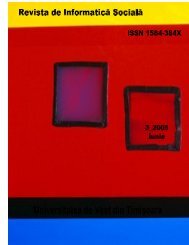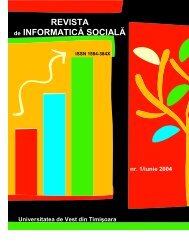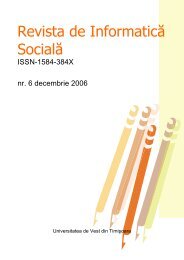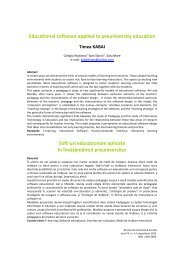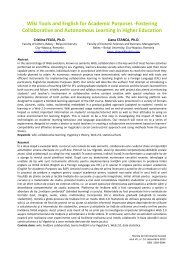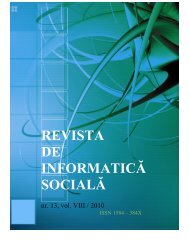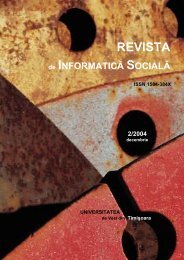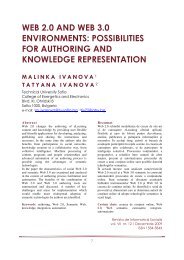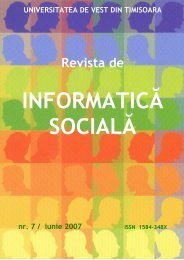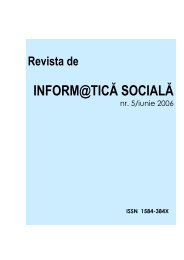The disruptive power <strong>of</strong> the events occurring in American higher education today is discussed in“Linking Analytics to Lifting out <strong>of</strong> Recession” [6]. If we miss the opportunity over the next severalyears to leverage these disruptions to increase national productivity and achieve financialsustainability, American colleges and universities may find themselves in an untenable,unsustainable and globally-uncompetitive position by 2020 or earlier [24].The for-pr<strong>of</strong>it (market-driven) sector un<strong>de</strong>rstands these challenges and opportunities and isresponding to them. When <strong>No</strong>rris and Dolence wrote Transforming Higher Education: A Vision forLearning in the 21st Century [1], they suggested the unbundling <strong>of</strong> <strong>of</strong>ferings and re-invention <strong>of</strong>higher education business mo<strong>de</strong>ls that have since been embraced by the for-pr<strong>of</strong>it universities andcommercial learning enterprises. <strong>No</strong>w is the time for practitioners <strong>of</strong> online, blen<strong>de</strong>d and e-learningto embrace the imperative to leverage innovations and transform practices and business mo<strong>de</strong>ls.This requires creating the enterprise organizational capacity to leverage the tools, techniques,processes, and practices <strong>of</strong> online, blen<strong>de</strong>d, and e-learning.Enterprise Organizational Capacity and Action AnalyticsEnterprise productivity is hard to improve without reliable information (analytics) about currentstatus, progress to <strong>de</strong>sired future states, and successes practices <strong>of</strong> innovators and market lea<strong>de</strong>rs.Analytics is one <strong>of</strong> the most powerful elements <strong>of</strong> organizational capacity enabled by advancedonline learning. One <strong>of</strong> the advantages <strong>of</strong> the online environment is that real-time performance an<strong>de</strong>ngagement can be monitored continuously. EDUCAUSE 2010 featured examples <strong>of</strong> affordableenterprise analytics for every kind <strong>of</strong> institution [25].Market-driven institutions such as Capella University and the American Public University Systemhave <strong>de</strong>veloped award-winning practices groun<strong>de</strong>d on a range <strong>of</strong> predictive analytics. Some <strong>of</strong>these are used to shape recruitment, admission, and shaping <strong>of</strong> policy. This enables them to <strong>de</strong>alwith at-risk learners. Other predictive analytics-gui<strong>de</strong>d practices are embed<strong>de</strong>d in aca<strong>de</strong>mic andadministrative processes to give early and continuous feedback on stu<strong>de</strong>nt performance and levels<strong>of</strong> engagement, compared with past patterns <strong>of</strong> successful stu<strong>de</strong>nts. This facilitates the efforts <strong>of</strong>institutions to <strong>de</strong>al with at-risk behavior in real time. Many public colleges and universities such asPurdue University, Rio Salado College, and Ball State University are also <strong>de</strong>ploying these tools togood effect.Enterprise Action Analytics also need to reach beyond postsecondary education; eventuallyspanning preK-20 education and linking learning and workforce analytics [26]. Previously cite<strong>de</strong>xamples suggest the potential divi<strong>de</strong>nds from analytics in improving success in both learning an<strong>de</strong>mployability. As the roles <strong>of</strong> online learning enterprises evolve and transform, analytics willcontinue to be a key differentiator for some provi<strong>de</strong>rs.Practice Expeditionary Reinventing and Re-imaginingAs lea<strong>de</strong>rs make re-inventing online learning (and its business mo<strong>de</strong>ls and associated processes andworkflows) a strategic priority, they should consi<strong>de</strong>r the full range <strong>of</strong> institutional and open learningoptions that are becoming the learning and competence-building universe in the 21st Century. Theyshould also take an “expeditionary” approach to such new learning initiatives, as initially <strong>de</strong>scribedin Hamel and Prahalad’s classic article, “Corporate Imagination and Expeditionary Marketing” [22]applied to higher education by <strong>No</strong>rris [4], and <strong>de</strong>scribed by Hagel and Brown as “radicalincrementalism” [23] – taking incremental, expeditionary steps, gui<strong>de</strong>d by radical intent. Theexpeditionary approach to learning and competence building <strong>de</strong>pends on the following principles:Lea<strong>de</strong>rs must be capable <strong>of</strong> and willing to re-imagine practices and processes based on value(outcomes, the experiences through which they are achieved, and price) and on fulfillingcritical needs, rather than focusing on year-on-year replicability <strong>of</strong> experiences, as a proxyfor quality.Recognize that Web-based, open, learner-centered learning and competence building requirecontinuous experimentation, refinement and re-invention.
Embed enterprise-wi<strong>de</strong> predictive analytics in aca<strong>de</strong>mic and administrative processes tosupport reimagining, enhancing learner success, and achieving financial sustainability. Complement existing <strong>of</strong>ferings with new, Web-based mash-ups and communities <strong>of</strong> practiceas “expeditions” relying on learners and participants to continuously provi<strong>de</strong> feedback onwhat is working and what is necessary in the near future; expeditionary initiatives need touse such feedback to evolve into fast, fluid, flexible and affordable solutions with high valuefor learners. Respond aggressively to opportunities to leverage valuable knowledge flows that fillknowledge gaps and meet critical, unmet needs for potential learners, addressingcombinations <strong>of</strong> innovation, entrepreneurship, employability and problem solving that haveelu<strong>de</strong>d traditional institutional-based approaches; then combine knowledge-gap andknowledge-pathway solutions.To be successful in Stages IV and V <strong>of</strong> the evolution <strong>of</strong> e-learning and competence building, futurecoaches, teachers and mentors will follow, evolve and improve these expeditionary principles.Focus Energies on America’s “Finishing First in Higher Education”If America is to reclaim its position atop the international league tables for education andcompetitiveness, we must focus our energies on relevant factors. Collaborations <strong>of</strong> key foundationsand public agencies have been funding initiatives to accelerate attainment <strong>of</strong> coveted courses <strong>of</strong>study, certificates and <strong>de</strong>grees. Respectfully, we <strong>of</strong>fer the following listing as a way to align onlinelearning with the Lumina Foundation’s Four Principles, and to do this to fit the challenges <strong>of</strong> the21st Century marketplace:Reward Institutions that Use Online Learning to Focus on Learners Completing High-Value Objectives and Demonstrating Competences. Completion <strong>of</strong> objectives is key;institutions should be provi<strong>de</strong>d incentives to improve the successful completion rates <strong>of</strong>learners. Institutions should also be incentivized to focus on value, meeting the needs <strong>of</strong>learners and employers.Use Online Learning to Track Stu<strong>de</strong>nts Who Should Be Rewar<strong>de</strong>d for CompletingCourses, Certificates, Degrees and Demonstrations <strong>of</strong> Competence. Again, it isimportant to provi<strong>de</strong> support systems, incentives and rewards that emphasize the completion<strong>of</strong> meaningful learning objectives. These can be courses, certificates, <strong>de</strong>grees or<strong>de</strong>monstrations <strong>of</strong> competence. The linkage between these learning objectives and the needs<strong>of</strong> the marketplace will receive increasing and critical attention.Use Online Learning to Expand and Strengthen Options that Reduce the Total Cost <strong>of</strong>Competence and Transformative Options at Market Prices (Push These Techniques intoPK-20). Policy makers and fun<strong>de</strong>rs should support the already robust efforts to reduce totalcost <strong>of</strong> competence and go to scale with such efforts. These are critical both to give learnersaffordable options and to enable institutional financial sustainability. To be optimallysuccessful, these practices must be pushed down into K-12 as well.Invest in Institutions that Use Online Learning to Demonstrate Good BusinessPractices that Focus on Stu<strong>de</strong>nt Success, Value, Productivity, Financial Sustainabilityand Linkages between Learning and Work. Without establishing a foundation forfinancial sustainability in the New <strong>No</strong>rmal, it will prove fruitless to increase stu<strong>de</strong>nt access,affordability and success. Policy makers and fun<strong>de</strong>rs should “water where the grass isgreen,” supporting institutions that are simultaneously achieving efficiencies, innovating inways that enhance stu<strong>de</strong>nt success and value, enhancing productivity and establishing freshrevenue sources – all critical to financial sustainability.In all four <strong>of</strong> these areas, use the organizational competences associated with online learningto strengthen the linkages between learning and economic returns. Also, support the parallel<strong>de</strong>velopment <strong>of</strong> knowledge gap/flows approaches in addition to knowledge pathways.
- Page 1: Revista de Informatica Sociala 14 /
- Page 7: ● ● ●CONTENTS● ● ●[9-20
- Page 10 and 11: THE TRANSITION FROM OLD TO NEW MEDI
- Page 12 and 13: 30252023.420.325.11510500.85.5Never
- Page 14 and 15: Overall, we can therefore sum up on
- Page 16 and 17: n.a.I often use itI seldom use it6.
- Page 18 and 19: - Traditional web use: searching th
- Page 20 and 21: 19. Kvavik R.B., Caruso J.B. and Mo
- Page 22: IntroductionIn 1995, Bernie Dodge o
- Page 25 and 26: The Web-Inquiry Project [WIP] is a
- Page 27 and 28: and even orally. The teacher will a
- Page 29 and 30: environment in which the teacher gu
- Page 31 and 32: Transformation Through Online Learn
- Page 33 and 34: INTRODUCTIONLeading practitioners a
- Page 35 and 36: learning. We also describe how the
- Page 37 and 38: Some of these transformations are b
- Page 39 and 40: Recently, Twigg has received suppor
- Page 41 and 42: Stage III: Unbundled Learning, Mark
- Page 43 and 44: perhaps using Second Life-like virt
- Page 45 and 46: performance. Indeed, Stage V will l
- Page 47 and 48: Free-Range Open LearningOver time,
- Page 49: New communities, tools and services
- Page 53 and 54: In collaboration with Strategic Ini
- Page 55 and 56: Wiki Tools and English for Academic
- Page 57 and 58: eality. Besides being an additional
- Page 59 and 60: StudentPage 1StudentPage nTeacher
- Page 61 and 62: 100%90%80%70%60%50%40%30%20%10%0%Ac
- Page 63 and 64: 200Correlation View/Page Edits150Vi
- Page 65 and 66: 14. http://eacea.ec.europa.eu/llp/s
- Page 67 and 68: Simularea şi comunicarea electroni
- Page 69 and 70: RespondenţiRăspunsuriLa nivelul
- Page 71 and 72: RespondenţiRăspunsuriLa nivelul
- Page 73 and 74: Respondenţii au fost rugaţi să i
- Page 75 and 76: Itemul 9 doreşte să identifice ti
- Page 77 and 78: Identificara opţiunii, chiar şi p
- Page 79 and 80: EşantioaneRăspunsuri/Ranguriagita
- Page 81 and 82: modalităţile practice prin care u
- Page 83 and 84: 1. INTRODUCEREÎn prezent, complexi
- Page 85 and 86: Figura 1. Analiza grafică a evolu
- Page 87 and 88: Faţă de această situaţie se deg
- Page 89 and 90: variabilele acesti noi culturi cybe
- Page 91 and 92: INTRODUCEREÎncă din anul 2000 am
- Page 93 and 94: după tipul lecţiei: prezentare de
- Page 95 and 96: Funcţiile oferite de AEL asigură
- Page 97 and 98: • elevi/studenţi, beneficiari di
- Page 99 and 100: Se poate folosi cadrul formal de co
- Page 102 and 103:
Evaluarea formativă este comentari
- Page 104 and 105:
Rezultatele elevilor, pe itemi:Diag
- Page 106 and 107:
Nr. Denumirea activităţii AEL MOO
- Page 108 and 109:
SEMNAL EDITORIALLaura MALITA, Vanna
- Page 110:
IN MEMORIAMConstantin TraianCHEVERE



